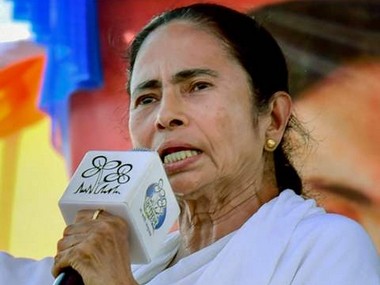Darr ke agey jeet hai (beyond fear, lies victory) is the popular tagline of a soft drink brand. It’s also a truism. Overcoming our fears leads to success, and it is as true in the personal sphere as it is in the political. Authoritarian regimes, for instance, operate on fear. They create a climate of dread to suppress voices of dissent, trigger self-censorship, draw obedience and demand allegiance. But dictatorial governments — such as the one that rules West Bengal right now — have an interesting relationship with fear.
While their foundations are based on fear and they work by convincing everyone to be afraid, the regimes themselves are its greatest victims. Dictators, or rulers with a dictatorial streak such as Bengal chief minister Mamata Banerjee, remain perennially scared of dissenting voices and popular uprising. Their hold over power — even within a democratic setup — is incumbent on controlling dissent from reaching a tipping point when society decides that an individual’s fight is also its own fight.
When that happens, more and more people cross the anxiety threshold by overcoming their personal fears. Voices from all corners of the society are raised, dissent is unleashed on a mass scale and suddenly, the almighty leader given to bullying behaviour seems small, tepid and shrunken in power.
The Observer, London, in article entitled How Dictators Fall, notes this change in societal calculus where the concerns of a few becomes everyone’s concern.
And that leads to rebellion of the kind we are seeing unfold over the last five days in the West Bengal.
“In the end, however, the success of a rebellion depends on the crossing of a fear barrier by enough people, not simply the small group of dedicated dissidents. A judgment that the risk is worth it and the rebellion might actually succeed.”
The protest and strike by junior doctors in West Bengal that has sent the state’s healthcare system into a coma could be the veritable tipping point that degrades Mamata’s ability to rule by fear.
What started as a fightback by junior doctors touched the medical fraternity at large. It soon transcended the geographical boundary of the state to become a national concern. Suddenly, the polity is pushing aside its fear and telling Mamata that ‘we are not afraid of your threats anymore’. Even the mainstream national media — that had lionised the Bengal chief minister, overlooked her autocratic ways to dress her up as Prime Minister Narendra Modi’s competitor — has been going after her.
Over 700 senior government-employed doctors in Bengal have resigned in solidarity with their junior colleagues, resident doctors in AIIMS and Safdarjung Hospital in Delhi have issued a 48-hour ultimatum to Mamata following a day’s strike on Friday and the country’s top medical body, Indian Medical Association (IMA), on Friday criticised Mamata’s approach to the protests in Bengal and accused her of “escalating the issue instead of solving it.”
Even the Calcutta High Court on Friday handed a snub to the Mamata government by refusing to pass any interim order on the strike by junior doctors. According to a report, a division bench comprising Chief Justice TBN Radhakrishnan and Justice Suvra Ghosh also directed Bengal government to apprise it of the steps taken following the attack on junior doctors, two of whom suffered serious injuries.
Hemmed in from all sides, the mighty leader who even on Thursday afternoon tried to bully and threaten the striking junior doctors and caregivers and let loose a vituperative volley against them at the SSKM, all of a sudden sounds conciliatory and defensive.
Mamata invited the protesting interns at the state Secretariat for “talks”, but Arindam Dutta, spokesperson of the joint forum of junior doctors spearheading the strike, told news agency PTI “we are not going to the Secretariat upon the invitation of the chief minister for the meeting. She will have to come to the Nil Ratan Sircar Medical College and Hospital and deliver an unconditional apology for her comments made during her visit to the SSKM Hospital on Thursday.”
Along with the “unconditional apology” from Mamata, the agitating doctors have made ending of their protest conditional on the government meeting their demands, which include, according to media reports , the chief minister paying a hospital visit to the two recuperating doctors injured in the murderous assault at the NRS on Monday, her office releasing a statement condemning the attack on them, documentary evidence of judicial inquiry against the inactivity of the police to provide protection to the doctors at the NRS on Monday night, unconditional withdrawal of all “false cases and charges” slapped on junior doctors and medical students across Bengal in the wake of their strike, better infrastructure in all health facilities and posting of an armed police personnel.
If this sounds harsh, then a bit of context is in order.
As noted city physician Binayak Sinha wrote for Economic Times , “West Bengal has had more than 175 episodes of violence against doctors and other healthcare professionals in the last two years alone.” These, as Sinha added, have largely been taken as a professional hazard by the doctors, but Monday’s incident, when two truckloads of goons arrived at the NRS hospital following the death of a septuagenarian and unleashed a wave of violence that critically injured two doctors before a mute Kolkata Police contingent, saw an important threshold crossed.
The incident exemplified anew how unsafe the work environment is for doctors and caregivers and how little the administration cares for their plight. What’s more, the Mamata government’s inaction in previous cases has emboldened the thuggish elements who now feel that they are above the law.
Sinha wrote: “Mamata Banerjee has stated that since the police are regularly beaten up and never protest, junior doctors should follow suit. One can surmise that it is this attitude of the political establishment that has resulted in hooliganism and violence today being treated as ‘normal’ in every sphere of activity in Bengal. The sacrosanct doctor-patient relationship lies destroyed by this open abetment to a lynch mob mentality by the administration.”
If the chief minister — who also handles the state’s health and home portfolios — had carried out her administrative duties instead of prioritising vote-bank politics, the situation needn’t have come to such a pass. But not only did Mamata fail to execute her constitutional duty, she tried to bully the doctors into submission by issuing an ultimatum and threatening to invoke Essential Services Maintenance Act (ESMA). What enraged the striking doctors even more was that she sounded soft on the goons whose attack dented the skull of Paribaha Mukherjee and harsh on the protesters whom she threatened to eject from hostel and labelled “outsiders.”
Some lackeys of the ruling party have tried to justify Mamata’s action by saying that the incident has been “politicised” by vested interests: the signal is towards the BJP that may stand to gain politically from the controversy. It is worth remembering, however, that if anyone tried to politicise the chain of events that arose from doctors’ legitimate and apolitical demand of a safe and violence-free work environment, it is the chief minister herself.
She labelled the striking doctors “outsiders” and even BJP agents.
India Today quoted the Bengal chief minister as saying, “This strike is a BJP conspiracy. The protesters are disrupting medical services. This should end at once.”
In an extraordinary rant on Thursday , she accused the agitating junior physicians of being “BJP voters”, as if that in itself is a crime. “All of you have voted for the BJP this time. Now you understand who you have voted for…” Not stopping there, she called all rebelling doctor “outsiders.”
“There is an attempt to create a communal divide but there can be no Hindu-Muslim divide among doctors. The junior doctors who are protesting are outsiders,” she thundered amid protests of “we want justice”. Mamata started her journey as chief minister by labelling any dissenter “Maoist.” Two terms into her role, she now sees the lotus blooming everywhere. Maybe she has a foresight that we lack.


)




)
)
)
)
)
)
)
)